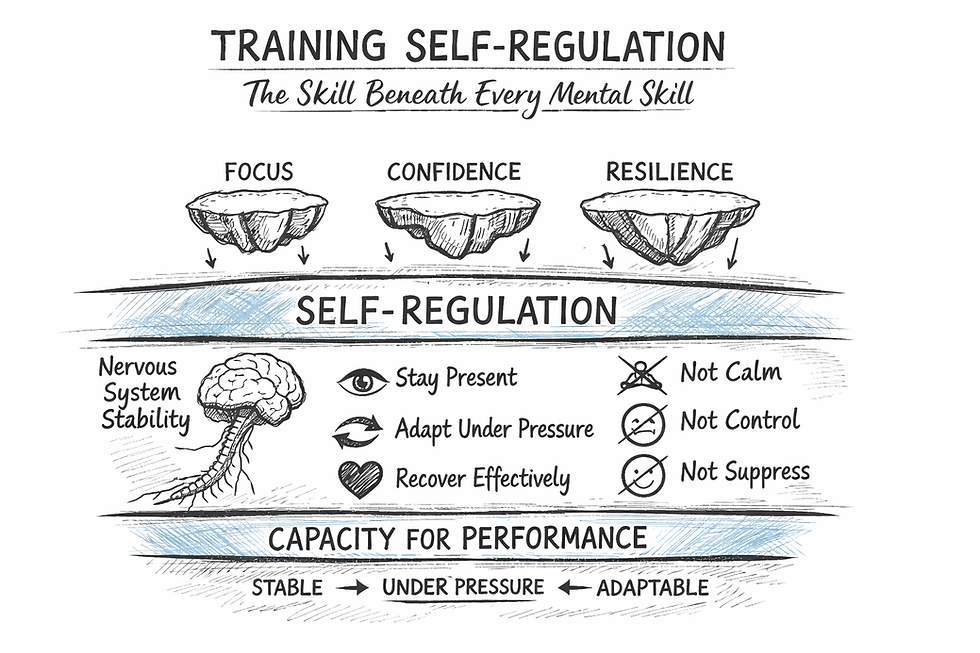Buying into Mental Performance Training: The Key to Unlocking Your Athletic Potential
- Kate Allgood
- Jul 17, 2024
- 3 min read
In the world of sports, physical training often takes the spotlight. Athletes focus on strength, speed, and technique, but what about the mental aspect of the game? Mental performance training is the secret weapon that separates good athletes from great ones. It's about developing the mindset and skills that not only enhance your performance but also sustain it under pressure.
Understanding the Importance
Buying into mental performance training means recognizing its profound impact on your athletic journey. It's not just about having a positive attitude or psyching yourself up before a match. It's about systematically training your mind to handle adversity, maintain focus, and perform at your best consistently.
Tips to Help You Buy In:
1. Educate Yourself
Start by understanding what mental performance training entails. Learn about techniques such as visualization, goal-setting, mindfulness, and self-talk. Recognize that mental skills, like physical skills, can be developed through practice and dedication.
2. Set Clear Goals
Define specific goals for your mental training. These could include improving concentration during games, managing pre-competition nerves, or enhancing your resilience in the face of setbacks. Clear goals provide direction and motivation.
3. Commit to Consistency
Just as you dedicate time to physical training, allocate regular sessions for mental performance training. Make it a part of your daily or weekly routine. Consistency is key to ingraining new habits and seeing long-term results.

4. Work with a Coach or Mentor
Seek guidance from a sport psychologist or mental performance coach who can tailor strategies to your needs. They can offer insights, techniques, and personalized plans to help you overcome mental barriers and optimize your performance.
5. Embrace Challenges
Mental performance training isn't always easy. It requires confronting your weaknesses, pushing through discomfort, and persisting through setbacks. Embrace challenges as opportunities for growth rather than obstacles.
6. Monitor Your Progress
Keep track of your mental training progress just like you would your physical gains. Celebrate small victories and learn from setbacks. Reflect on how mental strategies impact your performance and adjust your approach as needed.
Embrace the Journey
Buying into mental performance training is about investing in your future success as an athlete. It's about recognizing that your mental game is just as crucial as your physical abilities. By committing to mental performance training, you're not just improving your athletic skills—you're unlocking your full potential and setting yourself up for long-term success in sports and beyond.
Remember, Rome wasn't built in a day, and neither is a champion's mindset. Stay patient, stay persistent, and trust in the process. The rewards of mental performance training—enhanced focus, greater resilience, and peak performance—are well worth the effort.
Here's to elevating your game to new heights through the power of mental performance training.
Own your focus. Own your game
Kate
About: Kate Allgood is educated in the field of applied sport psychology. She holds two Masters degrees in psychology where she graduated with distinction. After a very successful hockey career, she has spent the past 14 years working one on one with high school, college, Olympic, and professional athletes to help them with their mindset, mental performance and mental skills training. Kate has also been a consultant for professional teams, including the Anaheim Ducks primary minor league affiliate the San Diego Gulls, to help the team and players develop their mental game. It is important to note that while Kate has graduate school training in applied sport psychology and general psychology, she does not diagnose or treat clinical disorders, and is not a licensed psychologist.
**The information provided is not to dispense medical advice or prescribe the use of any technique, either directly or indirectly, as a form of treatment for physical, emotional, or medical problems, without the advice of a physician. The information provided is only to offer information of a general nature to help you in your quest for high performance. If you know or suspect you have a health problem, it is recommended you seek your physician's advice.



Comments